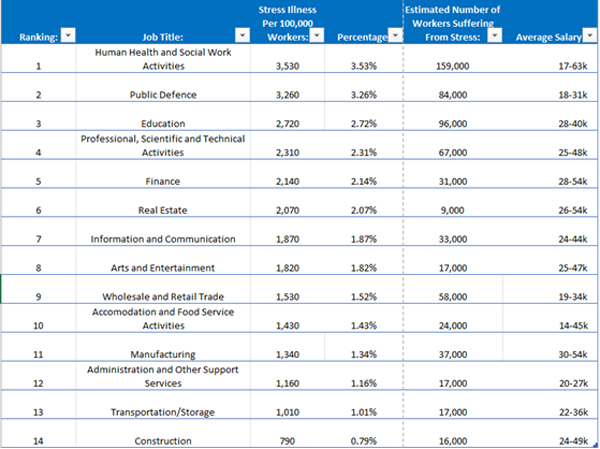
The stressful jobs chart
Human health and social work the most stressful job: study
LONDON, March 6, 2024
Human health and social work industry takes the top spot in the most stressful industries in the UK list, new research has revealed.
The study, conducted by personal injury experts at Claims.co.uk, analysed HSE data to examine the number of stress-related illnesses caused or worsened by employment per 100,000 workers from March 2022 to March 2023; the highest number of stress illnesses determined the ranking.
The study found that 3,530 people per 100,000 workers have been impacted by stress at work. However, this industry has one of the largest average salary ranges, between £17,000 ($21, 599.2) to £63,000, and includes jobs such as doctors, therapists, and nursing home assistants.
Public defence comes second
Public defence, which has an average salary range of £18,000 to £31,000, is revealed as the second most stressful industry. For every 100,000 workers, 3,260 reported a stress-related illness, meaning that security guards and prison officers are highly likely to suffer from work-related stress.
The education industry is third on the list, which has an average salary range of £28,000 to £40,000. For every 100,000 workers, 2,720 people reported work-related stress, which is an overwhelming figure of almost 3 in 100.
Ranking fourth on the list is the professional, scientific, and technical industry, which includes jobs such as solicitors and barristers, and has an average salary range of £25,000 to £48,000. The study revealed that for every 100,000 workers, 2,310 have suffered from work-related stress.
The finance industry ranks fifth on the list, with 2,140 workers reporting a stress-related illness per 100,000 people. However, the finance industry has a high salary range, ranging from £28,000 to £54,000, where job roles include accountants and bankers.
Real estate industry is sixth
The real estate industry ranks sixth on the list, which has an average salary range of £26,000 to £54,000 and includes jobs such as estate agents and property managers. The study reveals that for every 100,000 workers, 2,070 reported a stress-related illness.
The information and communication industry places seventh on the list, which has an average salary range of £24,000 to £44,000 and jobs such as IT workers and graphic designers. The study found that for every 100,000 workers, 1,870 people reported stress-related illnesses.
The arts and entertainment industry is eighth on the list; for every 100,000 workers, 1,820 people reported a stress-related illness. The industry includes jobs such as art directors, makeup artists, and background actors, and has an average salary range of £25,000 to £47,000.
Ranking ninth on the list is the wholesale and retail trade industry, where 1,530 people per 100,000 workers suffered from work-related stress. The average salary range is this industry is £19,000 to £34,000 and includes jobs such as sales administrators and retail cashiers.
The accommodation and food service industry is tenth on the list, which includes jobs such as bar staff and restaurant workers and has an average salary range of £14,000 to £45,000; 1,430 people in this industry suffered from work-related stress per 100,000 workers.
Tips for making personal injury claim
The study offers tips on making a personal injury claim for stress.
*Identify The Cause of Your Stress
The most common causes for stress at work often arise from heavy workloads, lack of employer support, and workplace bullying. When starting a personal injury claim for emotional harm, it’s crucial to identify the cause of your stress. Legally, employers owe their employees a duty of care in the workplace, so it’s important to recognise when they have harmed your emotional health.
*Make a Note of Your Emotions
In order to identify the cause of work-related stress, it can be useful to make a note of your emotions on a daily basis. This can help you keep track of your emotional health and can allow you to determine whether your mental health has significantly worsened during your employment. These notes can also be a helpful source during GP appointments.
*Speak to Your Employer About Any Concerns
Before starting a personal injury claim, it can be helpful to vocalise your concerns to your employer where possible. Perhaps the situation could be mitigated through negotiation, such as requesting a lighter workload; however, if your employer refuses to consider your mental well-being when distributing heavy workloads, this could be a potential cause for a personal injury claim.
*Keep Track of Any GP Appointments
It’s crucial to keep track of any GP appointments and maintain these medical records – many personal injury claims have to be submitted within three years of when the injury/emotional harm occurred, so these records can help speed up personal injury claims.
Mental health crisis
A spokesperson from Claims.co.uk, commented on the study: “We are currently living amid a mental health crisis, which means that it’s essential for us to look after ourselves and recognise when our mental wellbeing may be at risk, particularly in the workplace.”
“It’s fundamental for employers to protect their employees’ mental health. One of the main ways this can be done is to regularly check in with employees, aiming to create an open environment to discuss thoughts and feelings.”
“Some people may assume that personal injury claims are limited to broken bones and cuts, but they also extend to what people can’t see, such as mental, emotional, or psychological harm; so, if you have experienced stress at work, it is in your best interest to speak to a legal professional.”--TradeArabia News Service







